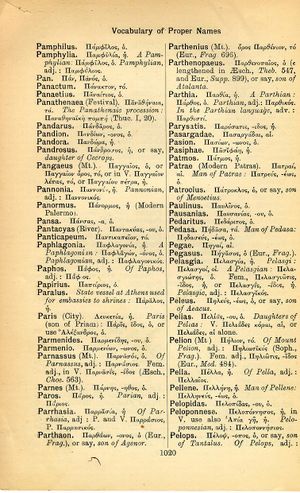Paros: Difference between revisions
Ubi idem et maximus et honestissimus amor est, aliquando praestat morte jungi, quam vita distrahi → Where indeed the greatest and most honourable love exists, it is much better to be joined by death, than separated by life.
(D_6) |
(Gf-D_6) |
||
| Line 1: | Line 1: | ||
{{WoodhouseENELnames | {{WoodhouseENELnames | ||
|Text=[[File:woodhouse_1020.jpg|thumb|link= | |Text=[[File:woodhouse_1020.jpg|thumb | ||
|link={{filepath:woodhouse_1020.jpg}}]]Πάρος, ἡ. | |||
<b class="b2">Parian</b>, adj.: Πάριος. | <b class="b2">Parian</b>, adj.: Πάριος. | ||
Revision as of 07:26, 14 August 2017
English > Greek (Woodhouse)
Πάρος, ἡ.
Parian, adj.: Πάριος.
Latin > English (Lewis & Short)
Păros: (-us), i, f., = Πάρος,
I one of the Cyclades, famous for its white marble and as the birthplace of the poet Archilochus, now Paro, Mel. 2, 7, 11; Plin. 4, 12, 22, § 67; Nep. Milt. 7, 2; Liv. 31, 15: marmoreamque Paron, Ov. M. 7, 465; cf.: Olearon niveamque Paron, Verg. A. 3, 126.—Hence,
II Părĭus, a, um, adj., Parian: crimine Pario accusatus, with respect to Paros (the failure to capture Paros), Nep. Milt. 8, 1: Glycerae nitor Splendentis Pario marmore purius, Hor. C. 1, 19, 5: marmor, Ov. P. 4, 8, 31; Petr. 126: lapis, Verg. A. 1, 592; Vulg. Esth. 1, 6: iambi, of Archilochus, Hor. Ep. 1, 19, 23.—In plur.: Părĭi, ōrum, m., the inhabitants of Paros, the Parians, Liv. 31, 31; Nep Milt. 7, 4; Plin. 36, 5, 4, § 14.
Latin > French (Gaffiot 2016)
Părŏs,¹⁵ Virg. En. 3, 126 ; Ov. M. 8, 221 et Părus, ī, f. Nep. Milt. 7, 2 ; Plin. 4, 67, (Πάρος), Paros [une des Cyclades, célèbre par ses marbres].

